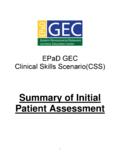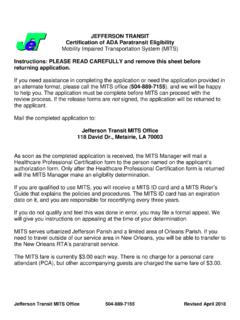Transcription of Advance Care Planning: Strategies and Tools to ... - Jefferson
1 Advance care planning : Strategies and Tools to Assist Providers, Patients and Families to Plan for End of Life care Authors: Nancy L. Chernett, MA, MPH, Susan M. Parks, MD, Brooke Salzman, MD, Leslie Peterson, MPH. Toolkit Workgroup: Eastern Pennsylvania/Delaware Geriatric Education Center Steering Committee 1. Table of Contents FUNDING ACKNOWLEDGEMENT .. 3. INTRODUCTION .. 4. Background .. 5. WHEN IS THE RIGHT TIME TO INITIATE THE ACP CONVERSATION? .. 5. Provider Resources .. 7. Provider Education and Training Tools .. 7. Resources to assist providers facilitating family meetings .. 9. Cultural Considerations in End of Life care .. 10. Religious/Spiritual Considerations .. 11. Patient/Family Resources .. 11. The Conversation Project .. 11. Caring Connections (NHPHO).. 12. Advance Directive Documents .. 12. Five Wishes .. 12. The Living Will Registry .. 12. Advance Directives from all 50 states .. 13. Family Caregiver Alliance (FCA) .. 13. Caring Connections .. 13. Professional Organizations and Advocacy Groups.
2 13. References .. 15. Interprofessional Guidelines/Standards .. 16. 2. FUNDING ACKNOWLEDGEMENT. The project described is supported by Grant Number #UB4HP19061 from the Department of Health and Human Services (HHS). Its contents are solely the responsibility of the presenters and authors and do not necessarily represent the official views of the Health Resources and Services Administration: Department of Health and Human Services. 3. INTRODUCTION. Hello and welcome to the EPaD GEC Interprofessional Advance care planning Toolkit. This toolkit contains various resources for providers, clinicians, patients, and caregivers. It is designed to assist you in accessing current information as well as recommended Tools , resources and identified best practices in Advance care planning . It is a supplement to our Advance care planning presentation. If you have not had an opportunity to access our educational resources, please visit our website to access them. The toolkit is divided into three categories of resources and Tools .
3 1) Resources are specifically designed for providers; 2) Resource to facilitate the ACP process that will be useful for professional providers, their patients and their patient's families; 3) Resources and Tools specifically designed for use by individuals who want to begin the ACP process. You will find education and training Tools , evidence- based interventions, access to state and alternative Advance Directive documents, information on professional, non-profit and advocacy organizations working to enhance and expand ACP in the United States. 4. Background Advance care planning (ACP) regarding patients' preferences for end of life care is an integral component of inter-professional patient centered care . Over the past 25 years, a large body of research has investigated patient and provider attitudes about end of life care and addressed the importance and challenges of Advance care planning (ACP). During this time high profile legal cases (Quinlan, Cruzan, Schiavo) have brought public attention and discourse to these issues.
4 The 2010 passage of the Patient Protection and Affordable care Act (ACA) again stimulated much controversy and discussion on the medical-legal-ethical dilemmas of providing care at the end of life. Legislation at the both federal level (Patient Self Determination Act, 1991) and at the state level has resulted in formal legal Advance directive documents. Professional organizations and advocacy groups have emerged for the purpose of educating, encouraging and supporting individuals, families and health care providers about ACP and the importance of discussing patient preferences in Advance of the last stages of life when critical decisions can be difficult. Despite extensive research, development of evidence based programs and the known benefits of ACP (Tamayo-Val zques, et. al. 2010) most Americans have not completed Advance directives nor had conversations with family members or health care providers about their preferences for end of life care . (California Foundation, 2012; Benson, et.)
5 Al, 2012). In recent years the ACP research and programs have put less emphasis on completing Advance Directives (AD) Living Wills and Durable Power of Attorney for Healthcare, and placed more attention on the ACP communication process (Briggs, 2004; Bischoff, et. al. (2013): Ramsaroop, et. al 2007). Research has shown that just completing ADs does not guarantee the patient's preferences are followed or result in quality of end of life care (Brinkman-Stoppelenburg, et. al. 2014). Conversing with patients and families about their values and beliefs on end of life care , and providing them with information on the type of treatment decisions that are often required, has been shown to actually increase AD completion rates (Tamayo-Val zques, et. al. 2010). Advance care planning can best be defined as an on-going values-based conversation among patients, their loved ones and health care providers which framed around establishing goals of care . The ACP process provides patients with a voice about their care when they no longer can communicate, preserving individual preferences and autonomy, as well as supporting the appropriate use of health care resources (Morrison, SE, Perrod JK, Cassel JB, et al.
6 ACP has also been shown to help alleviate emotional distress at the end of life for families. (Sudore, et. al, Dettering). WHEN IS THE RIGHT TIME TO INITIATE THE ACP CONVERSATION? Questions continue about the optimal time to begin the ACP process, with whom patients should discuss their preferences, and in what situations. Research has shown that many older adults think optimal time for ACP discussions is when they are relatively well (Malcomson, et. al. 2009). It is never too early to begin thinking about what is important to you--what gives your 5. life meaning, to help think through your preferences for care at the end of life (Gesme &. Wiseman, 2011). Most studies indicate that patients want to have these conversations with their primary care provider (PCP) (Ramsaroop, et, al 2007)). In some cases patients initiate this conversation with their PCP (see Conversation Project resource below), but it is most often left to the health care provider to initiate the process. The conversation may begin in the primary care setting with their physician, a nurse or social worker or in the hospital with a member of palliative care team or chaplain).
7 ACP is a dynamic process that often changes over time as individuals experience serious illness and/or develop chronic health conditions that worsen over time. As people age and adapt to physical and functional changes that may accompany worsening health (such as pain, reduced mobility or shortness of breath) they may feel differently about what they want at the end of life. Unfortunately, families are often confronted with end of life decisions when there are immediate questions about continuing intensive and/or curative treatment. This often occurs at the hospital bedside, frequently in an ICU or in long term care facilities at a time when curative treatment is no longer an option. It has been shown to be very stressful when ACP has not occurred and/or there are no Advance Directives documents. Whenever the time comes (hopefully sooner than later), it is important to view ACP as a process that permits patients to think about and express their wishes if possible, and for loved ones and healthcare providers to understand, accept and support their wishes.
8 Start Early, Focus on Goals, and Have Ongoing Discussions (Gesme & Wiseman, 2011). ACP includes multiple steps and ongoing discussion. The step-wise process is briefly described below. Contemplate your values and wishes for end of life care . There are Tools available to assist people with this process (see Conversation Project Starter Kit and Engaging with Grace in the resource section). Share with your family members what is identified as being most important and treatment preferences at the end of life. Begin the conversation with your health care provider about your values and preferences for end of life care as part of their overall goals of care . The conversation may be initiated by patient or health care provder. o The conversation is best framed as an on-going process which may change as an individual's health and functional status. o It is important that health care providers educate patients and families about health conditions, treatment options and trajectory of illness to facilitate 6.
9 Decisions on what care and treatments might be wanted or might not be acceptable. o Providers can provided patients and family with resource information to help them better understand the choices that may need to be made about care . Designate a Health care Agent/Representative typically a family member or close friend who knows and understands their preferences and has agreed to act as their agent should the patient not be capable of making their own decisions at the end of life. Document ACP conversations and patient preferences in their medical record. Legal documents ( Living will/ Healthcare Power of Attorney). Documentation may include medical chart orders such as Do Not Resuscitate (DNR), Do not Intubate (DNI), Do not Hospitalize (DNH). Revisit end of life care preferences with loved ones and primary care providers as health and functional status change over time. The following list of resources provides health care providers with Tools and Strategies designed to facilitate ACP process as described above.
10 Provider Resources Provider Education and Training Tools 1. Institute for Healthcare Improvement (IHI): Open School Course for Conversations about End of Life care In conjunction with the Boston University School of Medicine and The Conversation Project, the IHI Open School offers this online course to introduce students and health professionals to basic skills for having conversations with patients and their families about end-of-life care wishes. This course will also help you develop skills to have conversations with patients and their families about their preferences for care at the end of life. As part of developing these skills, the course invites you to have the conversation yourself, with a family member or other loved one. 2. Advance care planning : An Introduction for Public Health and Aging Services Professionals This web-based course developed by the CDC is targeted to public health and aging services professionals to consider their role in assisting older Americans plan and document what should be done in the event they become seriously ill or lose decision-making capacity.






